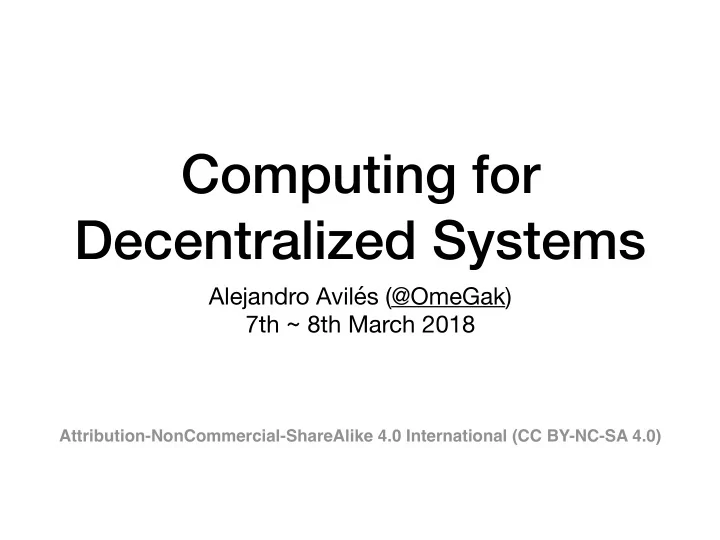

Computing for Decentralized Systems Alejandro Avilés (@OmeGak) 7th ~ 8th March 2018 Attribution-NonCommercial-ShareAlike 4.0 International (CC BY-NC-SA 4.0)
Distributed Systems
Distribute /d ɪˈ str ɪ b.ju ː t/ To give something out to several people, or to spread or supply something.
Distributed system Hardware or software components located at networked computers communicating and coordinating their actions to achieve a common goal only by passing messages.
Advantages Sharing resources Lower latency Fault tolerance
Complications Concurrency No global clock Independent failures
Security model Interfaces Cryptography Control and trust
Role-based architectures Client-server Peer-to-peer
Decentralized Systems
Decentralize / ˌ di ːˈ sen.tr ə .la ɪ z/ To move the control of an organization or government from a single place to several smaller ones.
Types of (de)centralization Architectural Political Logical (Location) (Authority) (Consensus)
Centralized systems
Decentralized systems https://youtu.be/C2vgICfQawE
Decentralization in Nature
Decentralization in Society
Decentralization in Computing
Consensus and Byzantine Fault Tolerance
Consensus /k ə n ˈ sen.s ə s/ A generally accepted opinion or decision among a group of people.
Network splits
Strong consistency Consensus Authority? Trust? algorithms
The two generals problem Attack at dawn ACK ACK' ACK''
The Byzantine generals problem 🤟 🤟
Scalability of trust Complexity of trust Trusted Centralization of O(N 2 ) generals authority
Governance, Economics, and Proof-of-Work
Governance / ˈɡʌ v. ɚ .n ə ns/ The way that organizations or countries are managed at the highest level.
Economics / ˌ i ː .k əˈ n ɑː .m ɪ ks/ The social science that studies the production, distribution, and consumption of goods and services focusing on the behaviour and interactions of economic agents.
The siege
Attack or retreat? Abort! Go go go! 🤟 Let's go back! Nope! Let's go! Retreat! 🤟
Let's vote Abort! Go go go! 🤟 Let's go back! Nope! Let's go! Retreat! 🤟 Retreat!
No central authority Abort! Go go go! 🤟 Let's go back! Nope! Let's go! Retreat! 🤟 Attack! x9
Treason ensues! 🤟 🤟
Proof of Work~ish
Economics in war
Expensive voting 🤟 🤟 Consensus!
Dominant strategy reward i = (loot / N) + valueOfStayingAlive i - (voteCost * votes i ) 🤟 voteCost > ???
Breaking the equilibrium? 🤟 ???
Bitcoin and the Blockchain
Bitcoin / ˈ b ɪ t.k ɔɪ n/ A purely peer-to-peer version of electronic cash that allows online payments to be sent directly from one party to another without going through a financial institution.
What is Bitcoin, really? 🤕
A database* Unrestricted read Unrestricted write * Append only ≃ Blockchain: Linked list of state updates
Bitcoin network
Bitcoin protocol Describes valid blocks Will others take my block? Should I take this block?
Bitcoin Measure of reward = Granted to block issuer Described in the protocol New valid block arrives
Bitcoin transactions Transmission of ownership Described in the protocol Broadcasted Validated by peers Inserted in blocks
A few problems 💪 ⚡ 🤟 Not a cost-free Not everybody Reward's worth service is trustworthy is subjective
So... WHY does this work, really? 🤰
Utility and cost Permission-less Resilient Not cost-free ≃
The mining game Valid blocks are rewarded Miners use CPU cycles They produce valid blocks
Validity chain Is this new block valid? Validators require past blocks
Reward ledger A database of transactions Anybody can broadcast Nobody can censor * Everybody can read
Bitcoin as currency = Portable Scarce 10' 10' Block creation is rate-limited Reward is not infinite
Censorship resistance 🤟 🤟
Sybil attack resistance Power into valid blocks Honest nodes make profit Power into invalid blocks Malicious nodes gain nothing
Race condition resistance 10' 10' 10' The longest chain rule Most work invested 10' 10' Adjustable di ffi culty Rate-limits updates
Proof of Work in Bitcoin
Block hashes Double SHA-256 Hash of the previous valid block + + Valid bitcoin transactions Nonce
Block mining Valid hash: 0000000000000000001b13... Nonce increases CPU used in SHA-256
Tampering with the past Blocks can be altered locally Hashes become invalid Invalid blocks must be re-mined Attacker must spend CPU
Single version of truth 10' Honest chain keeps growing ?' Attacker must outrun network 51% attack would allow this *
Bitcoin applications beyond cash
Ethereum, Smart Contracts, and Decentralized Applications
Contract / ˈ k ɑː n.trækt/ A legal document that states and explains a formal agreement between two different people or groups, or the agreement itself.
Ethereum A computer * Turing-complete Arbitrarily complex language transactions *
Smart Contracts Agreement Protocol to perform Breach is between parties on promises expensive
Contract design Who can resolve Reactive Proactive disputes? enforcement enforcement
Decentralizing contracts Arbiter replaced Reduced need Higher degree of by the blockchain for trust in humans * automation
Decentralized apps Golem Gnosis Etherisk Decentralized Crowdsourced Decentralized computing knowledge insurance Colony Aragon Decentralized Decentralized Decentralized business court systems digital nations?
The Future of Decentralization
Recommend
More recommend